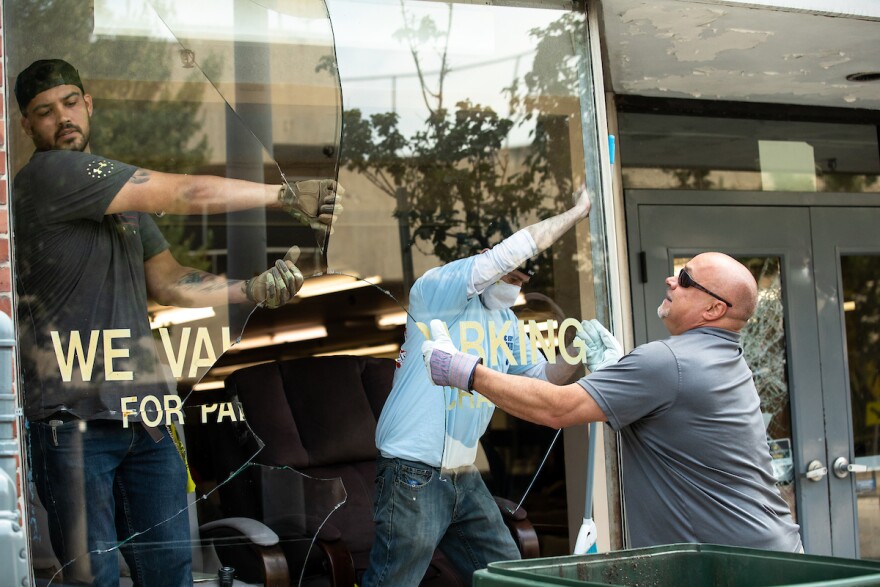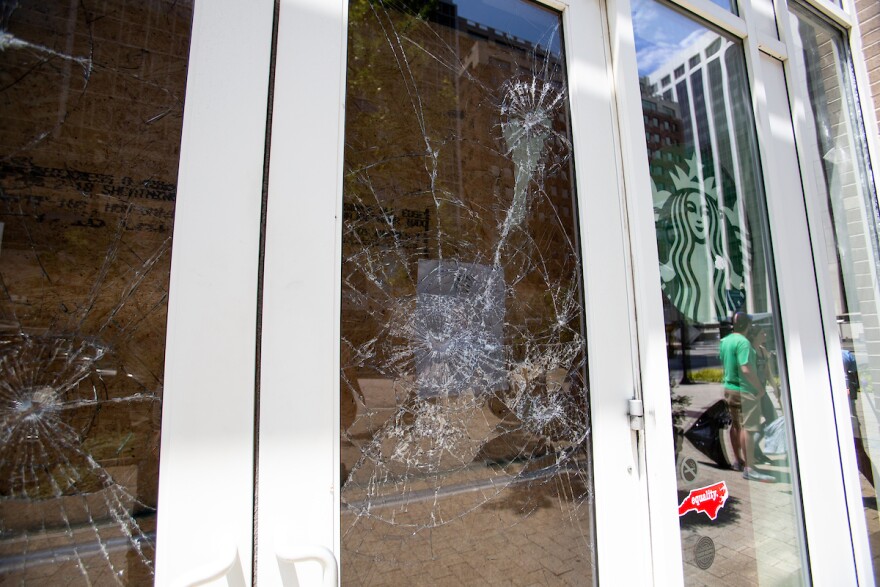Protests broke out in several North Carolina cities over the weekend. Almost all of them began peacefully, but as darkness descended each night, violent confrontations and looting took place in Fayetteville, Charlotte, and Raleigh. It was particularly damaging in the state capitol, where protestors damaged almost every storefront on Fayetteville Street.
By Sunday morning, downtown Raleigh buzzed with a different kind of commotion. The smell of cut plywood filled the air as business owners and volunteers boarded up frames where windows had been the day before.
Not 12 hours earlier, these same streets were a very different scene. Police dressed in riot gear used tear gas to disperse angry crowds that had turned from peaceful to confrontational.

Tensions escalated as night fell, and some protesters hurled rocks through windows and looted stores. Those events followed what had been a peaceful protest of around 2,000 people. They had first gathered outside the Wake County Courthouse on Fayetteville street, and then marched throughout the city.
Travion Bryant took part in the protests and was later hit in the leg with an exploding tear gas canister. He said he was protesting because he was tired of being scared every day.
"I'm scared to even drive, to be out at a certain time of night," Bryant. "I keep all my stuff on me. I don't want to go in my pocket and get shot."
Bryant said even in Raleigh – by many accounts, a progressive southern city – he feels fear as he goes about his daily life.
"As a black male, I am scared to drive by myself, be by myself," he said.

And that's precisely what protesters say drove them into the streets on Saturday. The death of George Floyd in Minneapolis last week was perhaps the catalyst for the timing of these particular events, but it was only the latest in a line of incidents that people of color say proves they are targeted by police.
Floyd's arrest Monday was caught on camera and he could be heard saying "I can't breathe" while a white officer, Derek Chauvin, pressed his knee on Floyd’s neck for several minutes. Chauvin was charged Friday with third-degree murder and second-degree manslaughter.
During the cleanup in Raleigh on Sunday morning, some business owners acknowledged what they said was a legitimate reason to protest.
Darren Bridger, owner of the London Bridge Pub on Hargett Street, said he was disappointed that his windows were smashed and his liquor stolen. But he was able to separate the vandalism from the larger movement.
"For me it's completely unrelated to the idea behind the original protest, you know?" he said. "And I still support the protest wholeheartedly, but this is something associated, but not related."
Of course, that's not to say he was happy about it.
"I don't forgive them," Bridger said. "But I don't associate it with the original protest at all."

Another downtown business owner, Damon Butler, took an even broader perspective. His creative services company sustained damage as well, but he said that was fixable.
"It's tough times right now, with corona and people being out of work, and these are people's livelihoods," Butler said. "But at the same time, the buildings, and the materials a lot of times can be replaced. But people can't be replaced. That's 100 percent true."
Butler said that oppressed minority groups have tried peaceful protests – without enough results.
"And here you are in a free country, and you abide by the rules for so long and so many years, and change comes very very slowly," he said, adding that it is the silence of good men and women that allows systemic racism to continue.
"It's going to take systematic change, and the good cops to enforce their values on those bad cops," Butler said. "It's going to take the good people sticking up their heads and saying, 'Hey, this is not right. This is wrong. Let's make some systematic changes.'"

Not too far away, Mayor Mary-Ann Baldwin and Police Chief Cassandra Deck-Brown held a hastily called press conference Sunday morning. Both appeared shaken, and Chief Deck-Brown did most of the talking.
"I get what it's like to be black, in more ways than many of you will ever imagine, or know," Deck-Brown said. "What I can't forget either is, the history of policing has not always been a polished career. And so we have to recognize the history of policing, and my officers have heard that. I'm the one who teaches it."
Events over the weekend added to that history, and left its mark. On Sunday, Wake County announced that several buildings, including the Courthouse and Justice Center, would remain closed after suffering significant damage.
ADDITIONAL PHOTOS:















